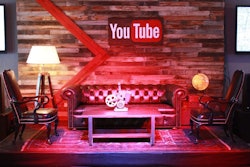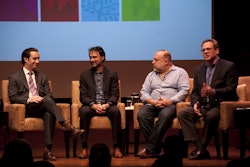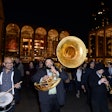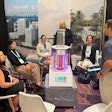
When it comes to meetings and networking events, some rules of etiquette stand the test of time (yes, you should wear that name tag). But with the prevalence of personal devices, as well as increasingly demanding schedules that make it harder to commit to attending an event, there are some grey areas about what's acceptable and what comes off as rude. We checked in with five etiquette experts to get their tips on behaving with grace as a guest at meetings and receptions. Here's how to steer your guests toward appropriate behavior.
1. Be clear about start time
Never leave guests wondering about what time to arrive, lest they appear rude. "Unless there is an emergency, [showing up] late is never acceptable," says etiquette expert Diane Gottsman of the Protocol School of Texas. Do be prepared to welcome guests a few minutes early—but only a few. "As a rule, guests should arrive no more than 10 minutes early. Fifteen minutes early is too early because it causes people hosting the meeting to feel obligated to accommodate you, plus they need to find some place for you to sit, offer you coffee, etc.," she says. "If you are the speaker, however, you need to arrive 30 minutes early, set up, check your technology, and be ready to start on time."
2. Advise your guests on dress code
For event guests, "your dress code should resemble the client you are meeting with," Gottsman says. "If you are on a yacht, dress casually. If you are in a corporate boardroom in a conservative environment, dress accordingly. It shows respect for your client." Constance Hoffman, owner of Social & Business Graces Inc., advises both men and women wear a jacket with large pockets to networking events. One pocket should be devoted to incoming business cards; the other, to outgoing cards.
3. Hold guests accountable for an R.S.V.P.
Give guests a reasonable window to reply to an event invitation, but expect them to respond within a few days of receiving it. "Otherwise, it looks like [they] are waiting for a better offer," Gottsman says. And for guests: "Once you have committed, you cannot back out. It would be terribly rude to try and attend several parties, just 'popping in' to each. The host has prepared in advance and expects your participation."
4. Allow personal devices into meetings
During a meeting, "it's perfectly acceptable to take notes on a tablet," says etiquette expert Jacqueline Whitmore. "People take notes electronically because it's faster than longhand. So as long as guests aren't checking Facebook or playing Candy Crush, it's perfectly all right." If guests have a smartphone, they should leave it on vibrate in their pockets—never on the table where it will make a noise and distract other meeting attendees. And don't allow guests to take personal calls in the boardroom. "If guests are expecting an important call, they should step outside the meeting to take it, and keep it brief."
5. Encourage guests to stay tidy
Once seated at a meeting, attendees should not spread out their papers into their neighbors' space, advises image and etiquette coach Kay Hunter. And when they leave, they should "clean up any cans, glasses, and napkins."
6. Tell guests to speak up—nicely—if they can't hear the speaker
"We've all been in that situation where the microphone doesn't work well and you can't hear the speaker," Whitmore says. "Somebody usually blurts out, 'We can't hear you.'" While it is acceptable for guests to let the speaker know that he or she can't be heard, Whitmore suggests doing so with a bit more tact—and using the speaker's name. "For example, if my friend Jim were speaking, I'd say, 'Excuse me, Jim. We can't hear you in the back. Could you please adjust the volume on the microphone?'"
7. Don't allow outside food into meeting rooms
Unless it's a lunch or breakfast meeting where everyone is eating, guests shouldn't "bring in [their] own food and be the only one eating," Whitmore says. "That's very uncomfortable, and it's unprofessional, too. How can you talk and engage with other meeting attendees if you're eating and your mind is on your cheeseburger? Plus, it smells."
8. Encourage guests to eat before an event
It's fine to have a few nibbles at a networking event—that's what the caterers are there for—but try to avoid a situation where filling up on snacks is guests' primary objective. "Grab something before you leave or a snack bar you can easily eat on the way to the event," suggests Laura Schwartz, author of networking guidebook Eat, Drink, and Succeed. "Sure there will be plenty of food at the party, but why would you want to stand around the buffet eating all night when you could be meeting people and grabbing new accounts instead of Swedish meatballs?"
9. Take the lead on ordering alcohol (or not)
At a business lunch or dinner, guests typically "follow the lead of the host" before they order alcohol, Gottsman says. If the host doesn't offer an alcoholic drink, guests shouldn't ask.
10. Allow guests to tip service staff
"The service industry works hard, long hours—on their feet," Schwartz says. If guests ask about appropriate tip amounts, Schwartz suggests advising them to tip a dollar or two per drink and $5 for valet.
11. Encourage mingling
"Jackie Kennedy had a rule at the White House," Schwartz says. "At social functions you were of course invited with a guest, but when you crossed the threshold of the dining room, you and your guest were seated at different tables. How many times have we brought a friend as our guest to an event and then spent the whole night talking only with them?"
12. Tell guests about Namerick
"When you meet someone, immediately use their name in conversation," Schwartz says. "Not only does it help you remember the name, but it makes the other person feel important as you use it, and they will actually pay more attention to you. If you still have trouble remembering names—yes, you guessed it, there's an app for that called Namerick."
15. Offer name tags
Of course, name tags help guests remember names, as well. If a guest needs help pinning the name tag on: "Name badges go on your right side," Hoffman says. "As people extend their hand to shake yours, the line of sight is to the other person's right side."
16. Don't monopolize anyone's time
At a networking event, advise guests that there's a "10-minute maximum" for speaking to one guest, Hunter says. When guests have to end a conversation, Hoffman suggests that they "make an attempt to introduce this individual to another, so as to not leave anyone alone."
17. Offer a coat check
"The last thing guests want is to meet someone at a party when it looks like they are actually leaving. Wearing your coat inside sends a strange signal," Schwartz says. "It can also make it physically uncomfortable for those around you when you're in a crowded space."



















